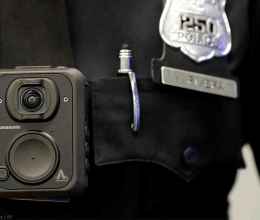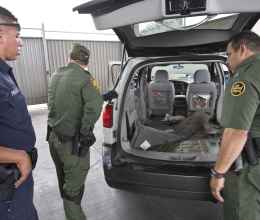But when Tarek decided to become a citizen like the rest of his family, the U.S. government blacklisted him to prevent him from gaining citizenship. The reason? His Muslim faith.
Tarek is far from alone. Under a secret -- and previously unknown -- national security program, the government has barred thousands of eligible, law-abiding immigrants from becoming citizens, obtaining green cards and securing other immigration benefits. The program purportedly excludes those who pose a national security threat. But U.S. Citizenship and Immigration Services (USCIS) -- the agency tasked with administering immigration benefits -- has used the program to sweep up innocent, law-abiding Muslim immigrants, delaying and denying their applications -- all without legal authority. This covert program sends one strong message to aspiring Americans: Muslims need not apply.
 Today, the American Civil Liberties Union of Southern California (ACLU SoCal) released areport that reveals how the "Controlled Application Review and Resolution Program" (CARRP) uses faulty watch lists and overbroad criteria to identify so-called "national security concerns" -- thus, snaring far too many in its net. CARRP flags applicants simply because of lawful religious activity, or they come from a certain country, or because their names are on or they are associated with someone whose name is on flawed terrorist watch lists. These applicants are then caught in a Kafka-esque web of delays, unaware of why their applications drag on for years -- and unable to respond to the government's "concerns."
Today, the American Civil Liberties Union of Southern California (ACLU SoCal) released areport that reveals how the "Controlled Application Review and Resolution Program" (CARRP) uses faulty watch lists and overbroad criteria to identify so-called "national security concerns" -- thus, snaring far too many in its net. CARRP flags applicants simply because of lawful religious activity, or they come from a certain country, or because their names are on or they are associated with someone whose name is on flawed terrorist watch lists. These applicants are then caught in a Kafka-esque web of delays, unaware of why their applications drag on for years -- and unable to respond to the government's "concerns."
Because the government refuses to disclose many details about the program, which began in 2008, the precise number of people swept up by CARRP's is not yet known. But the experiences of Tarek and other immigration applicants demonstrate the program's staggering scope.
The government rejected Tarek's application simply because he made his annual tithing (or a religious donation, known as zakat in Islam) to an Islamic relief aid organization. The government later shuttered the charity following allegations that it supported terrorism, and prosecutors charged its leader with defrauding donors like Tarek. Nonetheless, USCIS flagged Tarek, and what should have been a six-month citizenship process took 11 years, ending only when a judge ruled in his favor (after numerous attempts by USCIS to deny his application).
Under CARRP, USCIS also delays applications based on harmless contacts. Mahdi Asgari, an Iranian and practicing Muslim, was flagged after facing questions from the FBI about his relationship with an acquaintance from graduate school -- an acquaintance with whom Mahdi has scarce contact, beyond occasional holiday greeting emails.
"It shatters your belief to some extent in what America stands for," says Mahdi, a mathematics professor who was forced to wait three years before USCIS allowed him to become a citizen.
Hassan Razmara, an Iranian and practicing Muslim, is still waiting. It has been nearly six years. The reason: Hassan attended a West Covina mosque that was under FBI surveillance. The imam was later charged with several crimes, including filing false tax returns. Hassan did nothing wrong. But an FBI agent questioned him about the mosque, and asked Hassan to become an informant -- in exchange for expedited citizenship. Hassan declined. USCIS has yet to decide on his application.
Aspiring Americans aren't the only ones harmed by CARRP. It has caused dangerous shifts in governmental power, allowing USCIS to secretly create its own citizenship rules. CARRP tells USCIS officers to break the very laws they are bound to carry out -- to delay and deny applications that should be approved. And through CARRP -- which counsels deference to law enforcement regarding "national security" information -- the FBI now effectively determines whether to approve, delay or deny immigration benefits applications.
CARRP also sends conflicting messages. Many of the individuals swept up by CARRP -- and deemed possible security threats -- already live in the United States. Ironically, while USCIS clandestinely deems them too dangerous to become American citizens, they are also treated as too harmless to investigate, deport or prosecute, belying any serious argument that these individuals actually present any threat to our nation.
In the end, CARRP is un-American. Although Congress banned discrimination on the basis of race, national origin and religion from our immigration system in 1952, CARRP tells Muslims that they should not bother applying for citizenship or to become lawful residents of our nation. It tells them that they will confront a deceptive bureaucracy designed to deny them a place in our nation's community because of the country they hail from and the god they pray to. It tells them that the country they so desperately want to join based on equality and fairness is systematically violating the very principles of its founding.
Jennie Pasquarella is Staff Attorney, ACLU SoCal, and Ahilan Arulanantham is Deputy Legal Director, ACLU SoCal; Cross-posted from the Huffington Post


